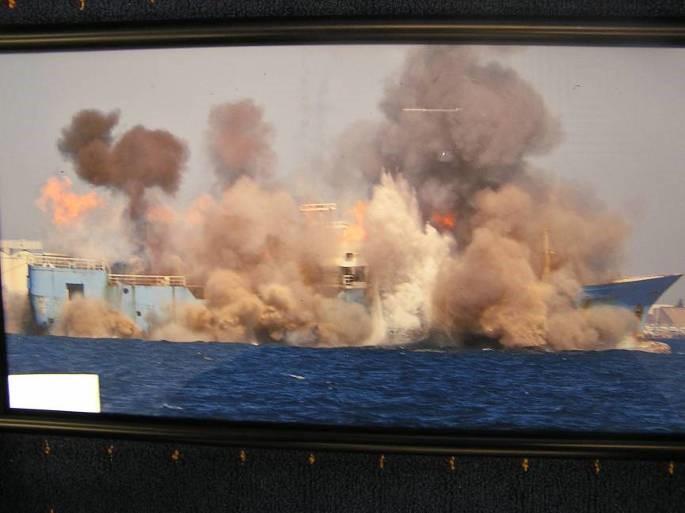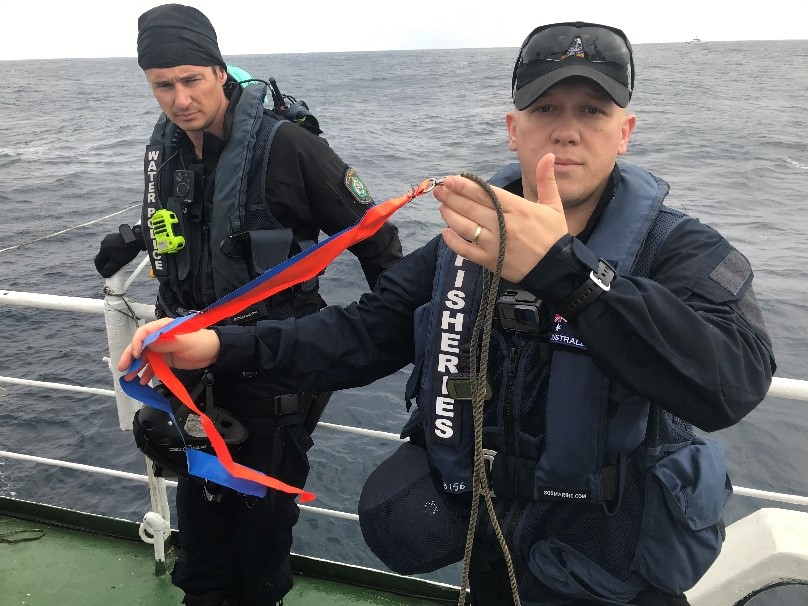AFMA is the lead Commonwealth agency for fisheries regulation and AFMA officers participate in surveillance and patrol activities to target illegal, unreported and unregulated (IUU) fishing and to meet Australia’s international obligations.
Australia shares maritime boundaries with a number of countries and AFMA works closely with these neighbouring countries to respond to fisheries incursions. For example, AFMA shares surveillance information relating to fishing activity with France (in the Pacific and Southern Oceans), Papua New Guinea, New Zealand, Indonesia and Timor-Leste under bilateral and multilateral arrangements.
AFMA undertakes such activities within the Australian Fishing Zone (AFZ), the Torres Strait, the Southern Ocean and in areas of the high seas where Australia has an interest.
Preventing and deterring illegal foreign fishing in the Australian Fishing Zone (AFZ)
AFMA works to prevent and deter illegal fishing in the AFZ through an active program of targeted asset deployment, detection and apprehension. Illegal foreign fishing operators can have their vessels seized along with the forfeiture of their fishing gear and catch.
This program includes working as part of the multiagency taskforce within the Maritime Border Command (MBC) to provide the fisheries component of the civil maritime security programme. AFMA supports the risk responsive tasking and deployment of surface and air assets to protect Australia’s natural resources from illegal exploitation. AFMA officers regularly embark on Australian patrol vessels to conduct patrols of high-risk regions and respond to sightings of suspected illegal fishing activity.
AFMA officers also participate in fisheries surveillance and enforcement patrols conducted by both Australia and Indonesia along our shared maritime boundaries. These patrols are a vital component of our joint efforts to deter illegal foreign fishing in Australia’s northern waters.
Case Study - Vessel caretaking and disposal
Australia is a leader in global action against IUU fishing, working with its neighbours and international partners to ensure the sustainability, security and economic development of its fisheries.
At a national level, AFMA works closely with the Maritime Border Command (MBC), a multi-agency taskforce within the Australian Border Force (ABF), to target and apprehend illegal foreign fishing vessels in Australian waters. Surveillance assets such as patrol boats and aircraft are managed in a maritime security program coordinated by MBC with input from clients such as AFMA. Aerial surveillance will targets potential IUU fishing and direct patrol vessels to vessels suspected to be involved in illegal fishing activities. Patrol vessels apprehend the targeted foreign vessels if offences are suspected to have been committed. Illegal operators face large fines and the confiscation and destruction of their vessel.
On arrival at port, AFMA officers undertake a full investigation of the alleged offences. The apprehended foreign vessel is delivered to a vessel caretaker, contracted by AFMA, and is detained at an inspection and treatment location while an Australian Biosecurity inspection is undertaken. This inspection includes the assessment for the presence of introduced marine and terrestrial pests and subsequent treatment.
If AFMA takes the decision to destroy the vessel, the vessel caretaker transfers the vessel to the vessel disposal contractor, who ensures pollution mitigation equipment is in place prior to removal of the vessel from the water. The vessel disposal contractor then removes the vessel from the water and disposes of the vessel either by incineration, or by fumigation and break-up at an approved Australian Biosecurity disposal facility.

Preventing and deterring IUU fishing on the high seas
Regional fisheries operations are a critical part of monitoring activity on the high seas in waters adjacent to the Australian EEZ.
A range of data is used to inform regional operations and target surveillance assets to risk areas. Vessel Monitoring Systems (VMS) are a core MCS tool used by AFMA to monitor vessels’ activities, domestically and on the high seas. Using VMS data supplied in accordance with data sharing arrangements, AFMA officers monitor vessels’ movements (position, course and speed) in the high seas during regional fisheries operations. This information is then compared to other available MCS data (e.g. AIS data, fishing licenses and inspection reports) to help detect and deter potential IUU fishing.
High Seas Boarding and Inspection (HSBI) measures have been adopted by regional fisheries management organisations (RFMOs) for the assessment of compliance of fishing vessels with international Conservation and Management Measures (CMMs) while at sea. AFMA officers conduct HSBIs as authorised inspectors under both domestic and international law.
Co-ordinated surveillance activities are undertaken throughout the year. Activities include centralised coordination, aerial surveillance and undertaking boarding and inspections of fishing vessels on the high seas to verify compliance with the RFMO CMMs.
AFMA will continue to engage and participate in regional fisheries enforcement operations with the aim to target regional IUU fishing threats.
Preventing and deterring IUU fishing in the Torres Strait
AFMA focuses its efforts, working in concert with Maritime Border Command, on illegal fishing activity by Papua New Guinean citizens within waters under Australian jurisdiction in the Torres Strait.
AFMA is also working with the Papua New Guinean National Fisheries Authority to combat illegal fishing in the Torres Strait region and to share information to support prosecutions or other deterrence measures. Sea cucumber (i.e. trepang) is a highly prized species because of its value and, as such, cooperative enforcement activities are focused on temporal and geographical risk areas.
Australia ratified the Torres Strait Treaty with Papua New Guinea in 1985, setting out the maritime boundaries and management of the resources in the area. Combating illegal fishing in the region will assist in meeting objectives of the treaty, including protecting the traditional way of life and livelihood of the Traditional Inhabitants of the Torres Strait and adjacent coastal areas of both Australia and Papua New Guinea.
Preventing and deterring IUU fishing in northern Australian waters
AFMA works to prevent and deter IUU fishing in waters across the north of Australia through an active program of detection, interdiction and sanctioning of illegal foreign fishers along with the forfeiture of their vessels and catch.
AFMA officers participate in coordinated patrols and joint exercises with its near neighbours in Indonesia. These operations are designed to share training and research expertise, boosting maritime security cooperation in the vicinity of our shared maritime boundaries.
A bilateral arrangement between Australia and Indonesia provides the framework for fisheries and marine cooperation, including facilitating information exchange to deter illegal fishing. Under the agreement, Indonesian traditional fishers, using traditional fishing methods only, are permitted to operate in an area of Australian waters in the Timor Sea, known as the MoU box.
Read more about traditional Indonesian fishing in the MoU Box.
Preventing and deterring IUU fishing in the Southern Ocean
Highly valued fish, such as Patagonian or Antarctic Ttoothfish, are the key species targeted by IUU fishers in the Southern Ocean.
Australia is a member of the Commission for Conservation of Antarctic Marine Living Resources (CCAMLR). CCAMLR meets annually and adopts a range of conservation measures aimed at securing the marine resources and ecosystem of the Southern Ocean. AFMA assists Australia to meet its obligations under all CCAMLR conservation measures, including in relation to CCAMLR’s Catch Documentation Scheme (CDS). The CCAMLR CDS is global in nature and seeks to ensure only legally caught toothfish enter the global trade.
AFMA supports Australia’s Southern Ocean patrol program, which is strengthened by working with France who share a maritime boundary with Australia in the Southern Ocean. A treaty between Australia and France and the related enforcement agreement provide for comprehensive surveillance and monitoring of waters under each other’s jurisdiction.
Australia also engages key port States to ensure illegally caught toothfish is not able to enter fisheries markets. Working closely with counterparts across South East Asia, Australia continues to share information and to assist countries in taking action to hold illegal fishers to account.
Preventing and deterring IUU fishing in the Pacific Ocean
AFMA helps lead the fight against IUU fishing in the Pacific region through its maritime surveillance activities and work with the Pacific Islands Forum Fisheries Agency (FFA) and other partners.
Since 2009, AFMA has regularly taken part in the annual joint patrols and maritime surveillance operations in the Pacific Ocean including Operations Rai Balang, Island Chief, Tui Moana and Kuru Kuru (FFA), Operation Tautai (France), Operation Nasse (Australia, France, New Zealand and USA), Operation Solania (Australia).
Since 2010, AFMA has participated in numerous US Coast Guard fisheries enforcement patrols of the WCPFC Convention Area and has provided subject matter expertise, including in Bahasa Indonesian.
AFMA, with the assistance of the other government agencies such as the NSW Water Police and Maritime Border Command, also lead fisheries patrols on the east coast of Australia and just outside our waters, on high seas areas of the Pacific Ocean. AFMA fisheries officers board and inspect fishing vessels to ensure that they are following agreed international rules and to ensure their operations do not undermine the sustainability of shared fish stocks which would have negative impacts on our fisheries.
Case study - Operation Nasse
Operation Nasse is a cooperative monitoring, control and surveillance (MCS) fisheries operation involving Australia, France, New Zealand and the United States of America. Operation Nasse has been conducted annually since 2015 in the high seas areas of the south-west Pacific Ocean.
Operation Nasse’s objective is to detect and deter IUU fishing and to monitor compliance with the Conservation and Management Measures (CMMs) of the Western and Central Pacific Fisheries Commission (WCPFC) and the South Pacific Regional Fisheries Management Organisation (SPRFMO).
These MCS operations provide a unique opportunity for AFMA authorised inspectors to gather information on how CMMs work in practice as well as enabling vessel operators to seek advice and information on applicable CMMs. For example, AFMA inspectors have been proactive in educating fishers and have subsequently seen an increase in the presence and use of turtle and seabird mitigation devices. This demonstrates a commitment and willingness by fishing crews and flag States to comply with CMMs. DNA samples are also taken from frozen processed fish on board to determine compliance with species reporting in daily logbooks.
